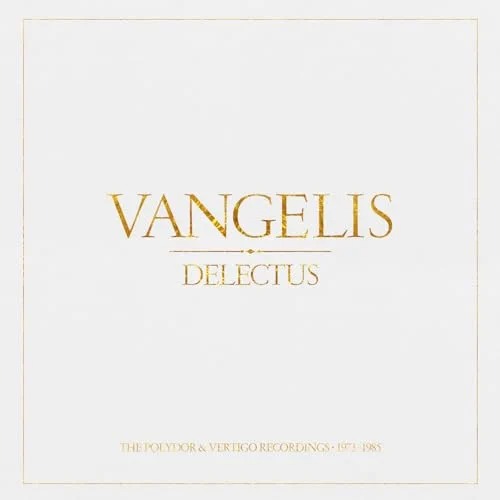Vangelis Lyrics
Sorted by Album Release Date
(View Sorted by Song Title)
From the Single
La Petite Fille de la Mer
From the Single Chariots of Fire
Other Songs A SONG ALBEDO 0.39 Albedo 0. 39 ALL OF IT Alpha ASK THE MOUNTAINS Blade Runner Blade Runner Blues Blade Runner (End Titles) Blush Response COME ON COME TO ME Conquest Of Paradise Creation Du Monde Damask Rose DAWN / MORNING PAPERS Dream In An Open Place Echoes Free Fall Friends of Mr. Cairo GOOD TO SEE YOU Heaven And Hell Part I HE-O Himalaya Hymne I CANT TAKE IT ANYMORE I Hear You Now I'll Find My Way Home Intergalactic Radio Station Italian Song Jerusalem La Mer Recommencee La Mort Du Loup Le Singe Bleu LET IT HAPPEN Light and Shadow LOSING SLEEP Losing Sleep (Still, My Heart) LOurs Musicien Love Theme Main Sequence MAIN TITLES MARE TRANQUILLITATIS Memories Of Green Messages Monastery of la Rabida Movement 5 MULTITRACK SUGGESTION MY FACE IN THE RAIN NOT A BIT - ALL OF IT One More Kiss Dear Page of Life Prelude PROCESSION P.S. PULSTAR Rachels Song RED LIGHTS Ritual Rêve SEE YOU LATER Shine for Me So Long Ago, So Clear State of Independence SUFFOCATION Sunny earth Sword Of Orion Tales Of The Future Tears In Rain The Little Fete Thermo Vision To a Friend To the Unknown Man TWILIGHT Wait For Me WE WERE ALL UPROOTED
From the Single Chariots of Fire
Other Songs A SONG ALBEDO 0.39 Albedo 0. 39 ALL OF IT Alpha ASK THE MOUNTAINS Blade Runner Blade Runner Blues Blade Runner (End Titles) Blush Response COME ON COME TO ME Conquest Of Paradise Creation Du Monde Damask Rose DAWN / MORNING PAPERS Dream In An Open Place Echoes Free Fall Friends of Mr. Cairo GOOD TO SEE YOU Heaven And Hell Part I HE-O Himalaya Hymne I CANT TAKE IT ANYMORE I Hear You Now I'll Find My Way Home Intergalactic Radio Station Italian Song Jerusalem La Mer Recommencee La Mort Du Loup Le Singe Bleu LET IT HAPPEN Light and Shadow LOSING SLEEP Losing Sleep (Still, My Heart) LOurs Musicien Love Theme Main Sequence MAIN TITLES MARE TRANQUILLITATIS Memories Of Green Messages Monastery of la Rabida Movement 5 MULTITRACK SUGGESTION MY FACE IN THE RAIN NOT A BIT - ALL OF IT One More Kiss Dear Page of Life Prelude PROCESSION P.S. PULSTAR Rachels Song RED LIGHTS Ritual Rêve SEE YOU LATER Shine for Me So Long Ago, So Clear State of Independence SUFFOCATION Sunny earth Sword Of Orion Tales Of The Future Tears In Rain The Little Fete Thermo Vision To a Friend To the Unknown Man TWILIGHT Wait For Me WE WERE ALL UPROOTED
Evangelos Odysseas Papathanassiou (Greek: Ευάγγελος Οδυσσέας Παπαθανασίου, pronounced [eˈvaɲɟelos oðiˈseas papaθanaˈsi.u]; known professionally as Vangelis (/væŋˈɡɛlɪs/ vang-GHEL-iss; Greek: Βαγγέλης, pronounced [vaɲˈɟelis]), was a Greek musician, composer, and producer of electronic, progressive, ambient, and classical orchestral music.
He composed the Academy Award-winning score to Chariots of Fire (1981), as well as for the films Blade Runner (1982), Missing (1982), Antarctica (1983), The Bounty (1984), 1492: Conquest of Paradise (1992), and Alexander (2004), and the 1980 PBS documentary series Cosmos: A Personal Voyage by Carl Sagan.
Vangelis reached his commercial peak in the 1980s and 1990s. His score for Chariots of Fire (1981) won him an Academy Award for Best Original Score and the film's main theme, "Chariots of Fire - Titles" went to number one on the U.S. Billboard Hot 100 chart, while his score for 1492: Conquest of Paradise (1992) was nominated for a Golden Globe Award for Best Original Score and the film's soundtrack and main theme topped the European charts selling millions of copies. His compilation albums Themes (1989), Portraits (So Long Ago, So Clear) (1996), and studio album Voices (1995) sold well.
Vangelis composed the official anthem of the 2002 FIFA World Cup held in Korea and Japan. In his last twenty years, Vangelis collaborated with NASA and ESA on music projects Mythodea (1993), Rosetta (2016), and Juno to Jupiter (2021), his 23rd and final studio album.
Having had a career in music spanning over 50 years and having composed and performed more than 50 albums, Vangelis is one of the most important figures in the history of electronic music, and modern film music. He used many electronic instruments in a fashion of a "one-man quasi-classical orchestra" composing and performing on the first take.
For a musician of his stature, very little is known about Vangelis' personal life; and he rarely gave interviews to journalists. In 2005, he stated that he was "never interested" in the "decadent lifestyle" of his band days, choosing not to use alcohol or other drugs. He also had little interest in the music industry business and achieving stardom, realising "that success and pure creativity are not very compatible. The more successful you become, the more you become a product of something that generates money". Instead, he used it to be as free and independent as possible and often rejected the opportunity to promote or capitalise on his fame.
Vangelis was suffering from several health issues in the last couple of years and died of heart failure on 17 May 2022, at the age of 79, at a hospital in Paris, where he was being treated for COVID-19.
In 1989 Vangelis received the Max Steiner Award. France made him a Knight of the Order of the Arts and Letters in 1992 and promoted him to Commander in 2017, as well as Knight of the National Order of the Legion of Honour in 2001. In 1993 he received the music award Apollo by Friends of the Athens National Opera Society. In 1995, Vangelis had a minor planet named after him (6354 Vangelis) by the International Astronomical Union's Minor Planet Center (MPC) at the Smithsonian Astrophysical Observatory; the name was proposed by the MPC's co-director, Gareth V. Williams, rather than by the object's original discoverer, Eugène Joseph Delporte, who died in 1955, long before the 1934 discovery could be confirmed by observations made in 1990. In 1996 and 1997, Vangelis received awards at the World Music Awards.
The American Film Institute nominated Vangelis's scores for Blade Runner and Chariots of Fire for their list of the 25 greatest film scores.
-Wikipedia
Birth Name: Evangelos Odysseas PapathanassiouHe composed the Academy Award-winning score to Chariots of Fire (1981), as well as for the films Blade Runner (1982), Missing (1982), Antarctica (1983), The Bounty (1984), 1492: Conquest of Paradise (1992), and Alexander (2004), and the 1980 PBS documentary series Cosmos: A Personal Voyage by Carl Sagan.
Vangelis reached his commercial peak in the 1980s and 1990s. His score for Chariots of Fire (1981) won him an Academy Award for Best Original Score and the film's main theme, "Chariots of Fire - Titles" went to number one on the U.S. Billboard Hot 100 chart, while his score for 1492: Conquest of Paradise (1992) was nominated for a Golden Globe Award for Best Original Score and the film's soundtrack and main theme topped the European charts selling millions of copies. His compilation albums Themes (1989), Portraits (So Long Ago, So Clear) (1996), and studio album Voices (1995) sold well.
Vangelis composed the official anthem of the 2002 FIFA World Cup held in Korea and Japan. In his last twenty years, Vangelis collaborated with NASA and ESA on music projects Mythodea (1993), Rosetta (2016), and Juno to Jupiter (2021), his 23rd and final studio album.
Having had a career in music spanning over 50 years and having composed and performed more than 50 albums, Vangelis is one of the most important figures in the history of electronic music, and modern film music. He used many electronic instruments in a fashion of a "one-man quasi-classical orchestra" composing and performing on the first take.
For a musician of his stature, very little is known about Vangelis' personal life; and he rarely gave interviews to journalists. In 2005, he stated that he was "never interested" in the "decadent lifestyle" of his band days, choosing not to use alcohol or other drugs. He also had little interest in the music industry business and achieving stardom, realising "that success and pure creativity are not very compatible. The more successful you become, the more you become a product of something that generates money". Instead, he used it to be as free and independent as possible and often rejected the opportunity to promote or capitalise on his fame.
Vangelis was suffering from several health issues in the last couple of years and died of heart failure on 17 May 2022, at the age of 79, at a hospital in Paris, where he was being treated for COVID-19.
In 1989 Vangelis received the Max Steiner Award. France made him a Knight of the Order of the Arts and Letters in 1992 and promoted him to Commander in 2017, as well as Knight of the National Order of the Legion of Honour in 2001. In 1993 he received the music award Apollo by Friends of the Athens National Opera Society. In 1995, Vangelis had a minor planet named after him (6354 Vangelis) by the International Astronomical Union's Minor Planet Center (MPC) at the Smithsonian Astrophysical Observatory; the name was proposed by the MPC's co-director, Gareth V. Williams, rather than by the object's original discoverer, Eugène Joseph Delporte, who died in 1955, long before the 1934 discovery could be confirmed by observations made in 1990. In 1996 and 1997, Vangelis received awards at the World Music Awards.
The American Film Institute nominated Vangelis's scores for Blade Runner and Chariots of Fire for their list of the 25 greatest film scores.
-Wikipedia
Born: 29 March 1943
Died: 17 May 2022
From: Agria, Greece
Genre(s): Electronic, ambient, classical, progressive rock
Instrument(s): Keyboards, synthesizers
Occupation(s): Composer, arranger, producer
Active From: 1963-2022
Associated Acts: Aphrodite's Child, Jon & Vangelis


